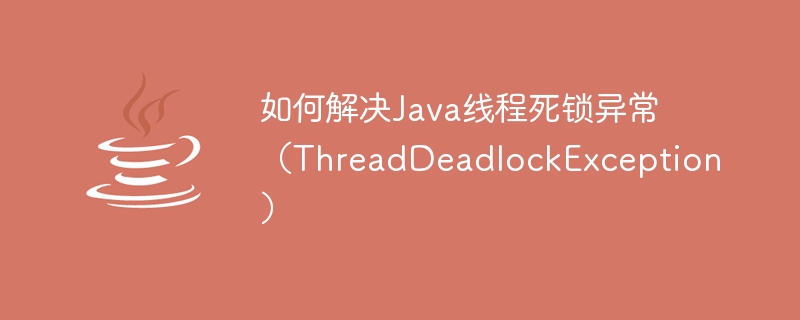Home >Java >javaTutorial >How to solve Java thread deadlock exception (ThreadDeadlockException)
How to solve Java thread deadlock exception (ThreadDeadlockException)
- WBOYWBOYWBOYWBOYWBOYWBOYWBOYWBOYWBOYWBOYWBOYWBOYWBOriginal
- 2023-08-21 19:29:041301browse

How to solve Java thread deadlock exception (ThreadDeadlockException)
Introduction:
Multi-threading is one of the commonly used features in Java programming, but in a multi-threaded environment Under this situation, thread deadlock exceptions may occur, that is, threads are waiting for each other to release resources and cannot continue execution. This article will discuss the causes of thread deadlock exceptions and provide some common methods and sample codes to solve thread deadlocks.
1. Causes of thread deadlock exceptions
Thread deadlocks are usually caused by the following reasons:
- Mutual exclusion conditions: caused by threads competing for shared resources. deadlock.
- Request and hold conditions: Threads hold some resources and request resources from other threads, but keep the resources they have obtained, causing each other to wait.
- Nondeprivation condition: The resources held by a thread cannot be deprived by other threads and can only be released by themselves.
- Loop waiting conditions: A relationship between threads forming a loop waiting for resources.
2. Methods to solve thread deadlock
- Avoid using too many synchronization blocks:
Too many synchronization blocks will increase the probability of deadlock. Because the thread needs to wait for other threads to release the lock before it can continue execution. You can minimize the number of synchronization blocks or use finer-grained locks to reduce the probability of resource contention between threads. - Avoid circular waiting:
Try to avoid the formation of a circular waiting relationship between threads for resources. You can use the ordering of resources to avoid circular waiting, such as numbering resources and requiring threads to obtain resources in numerical order. - Use timed locks:
Timed locks are a mechanism that increases the waiting time when requesting resources. If the waiting time is too long, you can give up the current resource request, release the acquired resources, and try to acquire the resources again. - Use the Lock object:
Java provides the Lock interface, which is more flexible than the synchronized block. You can try to acquire the lock through the tryLock() method instead of waiting forever. If acquisition of the lock fails, you can choose other operations to avoid deadlock. - Avoid nested locks:
If a thread tries to acquire another lock while holding one lock, and another thread tries to acquire the first lock while holding another lock, It will lead to deadlock. Therefore, you should avoid holding one lock while trying to acquire other locks.
3. Thread deadlock exception sample code
The following is a simple sample code that shows the thread deadlock exception and how to solve it.
public class DeadlockExample {
private static final Object resource1 = new Object();
private static final Object resource2 = new Object();
public static void main(String[] args) {
Thread thread1 = new Thread(() -> {
synchronized (resource1) {
System.out.println("Thread 1: Holding resource 1");
try {
Thread.sleep(1000);
} catch (InterruptedException e) {
e.printStackTrace();
}
synchronized (resource2) {
System.out.println("Thread 1: Holding resource 1 and 2");
}
}
});
Thread thread2 = new Thread(() -> {
synchronized (resource2) {
System.out.println("Thread 2: Holding resource 2");
try {
Thread.sleep(1000);
} catch (InterruptedException e) {
e.printStackTrace();
}
synchronized (resource1) {
System.out.println("Thread 2: Holding resource 2 and 1");
}
}
});
thread1.start();
thread2.start();
}
}In this sample code, two threads hold two resources, resource1 and resource2 respectively, and try to obtain another resource. If two threads are running at the same time, a thread deadlock exception will occur because each thread is waiting for the other to release resources.
In order to solve this problem, we can adjust the order in which threads obtain resources to ensure that threads obtain resources in the same order. For example, we can change the acquisition order of thread 2 to obtain resource1 first and then resource2. By adjusting the order in which resources are obtained, the deadlock problem can be solved.
Conclusion:
Thread deadlock exception is a common problem in multi-threaded programming, but it can be solved by avoiding too many synchronization blocks, avoiding loop waiting, using timed locks, and using Lock objects. When writing multi-threaded code, you should pay attention to the above methods to avoid problems caused by thread deadlock.
The above is the detailed content of How to solve Java thread deadlock exception (ThreadDeadlockException). For more information, please follow other related articles on the PHP Chinese website!

